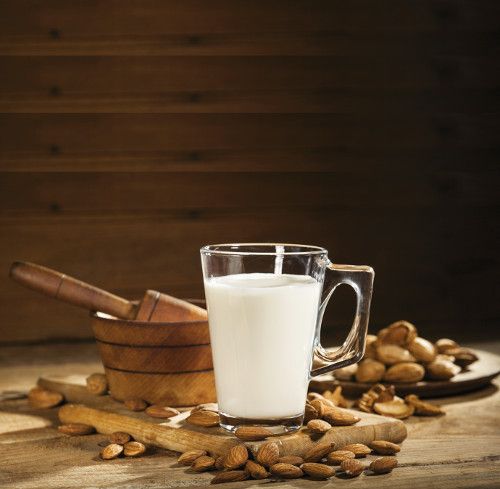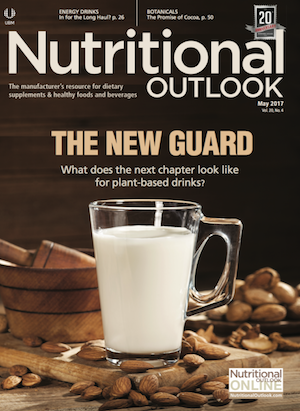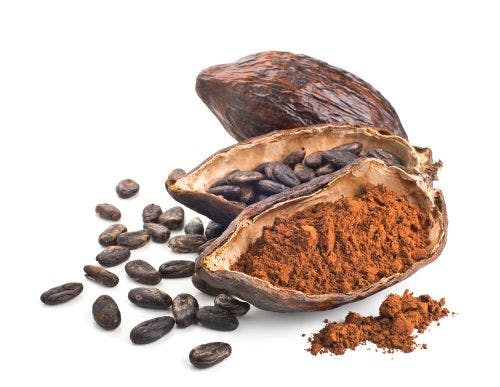The Next Generation of Plant-Based Beverages
Come one, come all…to the plant-based-beverage market.
Photo © Shutterstock.com/Nikolay Litov

Plant based is more than a buzzword. It’s a lifestyle trend driven by consumer interest in both personal wellness and concern for the global ecosystem, and it’s got staying power, according to those monitoring the food and beverage industries and those marketing plant-based brands.
Hope Lee, senior analyst for Euromonitor, explained in an August 2016 podcast on this topic that consumption of plant-based foods and beverages is increasing because consumers tend to perceive them as natural, safer, and more sustainable than animal products. A cultural paradigm shift away from meat-centered meals is evident in a number of high-profile consumer cooking magazines, health and wellness books, restaurants, and cookbooks, and has given rise to the “flexitarian” eater: a person who chooses a predominantly vegetarian diet but who does still eat some meat. The emergence of the flexitarian lifestyle, Lee says, “has created opportunities for plant-based food and beverage products in terms of innovation and new-product development.” She adds, “Manufacturers are actively looking for and exploring traditional plants to make them into delicious and nutritious food and beverage products.”
Got Milk? Yes, but Now It’s Plant Based
Indeed, “the steady growth of the plant-based food and beverage industries shows that consumers continue to shift away from animal products toward plant-based options,” agrees Michele Simon, executive director, Plant-Based Foods Association (PBFA; San Francisco, CA), citing a recent Mintel report that estimates annual sales of plant-based non-dairy beverages at $2 billion, with that figure forecast to climb to $3 billion by 2020.
Consumers seeking plant-based alternatives to traditionally animal-based nutrition are, based on the data, finding their entrée in these non-dairy “milks”: beverages made from nuts, soybeans, legumes, and seeds that are marketed as cow’s milk replacements for use with breakfast cereals, coffee, smoothies, and cooking, and for drinking on their own straight from a glass. (For more on the term milk as it relates to dairy versus plant-based beverages, see the sidebar below, “When Is a Milk Not a Milk?”)
“For a long time, soy milk was the only game in town for dairy alternatives,” Simon says. (The non-dairy sector is well represented in PBFA’s membership.) “That’s not true anymore. There are many more options on the market now” for non-dairy, plant-based beverages, Simon says. “Almond milk has become a large category, for example.”
Data gathered by Innova Market Insights, which tracks global new-product launches in various health, wellness, and nutrition categories, illustrates the rise of dairy-alternative plant-based beverages, particularly from sources other than soy. “There has been a phenomenal growth of plant-based drinks” in general, the firm’s director of innovation, Lu Ann Williams, finds, demonstrated by “a 32% increase in global new-product-launch activity tracked for the dairy-alternative drinks category in 2016.” Furthermore, the United States was the leading country for new-product-launch activity in this category in 2016, Williams adds, representing 10% of all new dairy-alternative drink launches tracked.
These launches do, in fact, venture way beyond soy. Williams lists tree nuts (almonds, hazelnuts, cashews, walnuts, macadamias, pistachios, pecans), coconut, grains (rice, oats, barley), chia, hemp, and flaxseed as currently trending plant-based-beverage components. And “one of the more innovative ingredients to date to emerge is yellow peas, used as a base for the Ripple plant-based range of milks launched in the United States” about a year ago, she adds. “Manufacturers are also getting more creative in blending [plant-based] milks, with Silk’s Protein & Nut Milk Almond & Cashew beverage being a good example of this trend.”
As competition in the non-dairy, plant-based-milk market grows, there is “no shortage of flavor profiles that companies-big and small-are experimenting with,” PBFA’s Simon says. “It’s great to see this explosion of companies wanting a piece of the action when it comes to dairy alternatives. They are getting very creative and innovative with their various offerings.” Califia Farms has introduced a Toasted Oats ’N Almond flavor of almond milk, for example, and the company also recently introduced a line of new non-dairy almond-milk coffee-creamer flavors, including Irish Cream, Mexican Cocoa, and Dulce de Leche.
Williams’s analysis aligns with Simon’s; Innova Market Insights singles out the 2016 launch of Bolthouse Farms’ blueberry-banana almond-milk beverage as a recent example of flavor innovation, as well as Trader Joe’s seasonal Pumpkin Spice almond milk.
Ingredient Mixer: The Elixir
Innovation in plant-based beverages is also occurring through the incorporation of “functional, value-added ingredients,” as Innova Market Insights calls them, such as herbs and spices, to offer potential health boosts. “The elixir,” says Jim Tonkin, president and owner, HealthyBrandBuilders, a beverage consulting and development firm, “is a new derivation category that’s growing. It marries the traditional plant proteins and compounds that you would think of going into beverages [including, in some cases, coffee] with the traditional herbs-and-spices side of the business, such as the turmerics and gingers.” Elixirs, such as Immordl, which Tonkin (who sits on Immordl’s board and serves as strategic consultant) called “a huge hit” at Natural Products Expo West this past March, combine protein, fiber, spices, herbs, and other botanicals, and “make them taste good,” Tonkin says, “putting enough of them into the beverage to make an efficacious dose, so you don’t just get a taste bang, but you feel something when you drink it.”
Immordl’s mélange of ingredients includes coffee, coconut milk, ground chia seed, guarana seed, maca root, and others. Additional brands emerging in this category include Rebbl, with its varied line of elixirs that contain such wide-ranging ingredients as turmeric, reishi, matcha, maca, ashwagandha, pea protein, sunflower protein, coconut milk, and coffee; and, in the UK, Plenish Elevate Organic Dairy Free Nut Milk with turmeric, almonds, coconut nectar, ginger, and pepper.
Non-Dairy Creamers: Plant-Based Beverages’ Dark Horse
Reporting from the show floor in a video recorded during Natural Products Expo West 2017, BevNet founder and CEO, John Craven, made this telling comment about non-dairy coffee creamers: “It’s one of those spaces I think a lot of people in the beverage industry don’t think about all that much. But it is a good application, certainly, for their products.”
Indeed, with about 64% of Americans drinking at least one cup of coffee per day, according to a 2015 Gallup poll, and the aforementioned rise of flexitarianism, plant-based non-dairy creamers and half-and-half products would seem to have a built-in customer base ripe for tapping. Califia Farms seized this opportunity early and, fortuitously, saw sales of its almond-based Nutmilk Creamer grow a stunning 138% in 2016, according to Califia’s vice president of marketing, Vilma Livas, making it the fastest-growing non-dairy creamer brand in the refrigerator case. As mentioned, Califia Farms debuted several new creamer flavors earlier this year at Natural Products Expo West.
Another successful key player to emerge in the plant-based non-dairy creamer space is Nutpods, which launched its shelf-stable, unsweetened, coconut- and almond-based product in May 2015 on Amazon.com and in Pacific Northwestern retail establishments. According to Michele Silbey, senior marketing manager for Nutpods, sales have increased every month since launch, and the product is the current (as of March 2017) bestselling alternative creamer on Amazon, “with customer review levels similar to those of Coffee-Mate,” Silbey says.
Other brands venturing into the coffee-creamer domain include Ripple, whose co-CEO Adam Lowry says his brand of pea protein–based beverages will launch a half-and-half product this year, and both Austin, Texas–based MALK and California-based New Barn, which have “barista blend” creamer products they showed off at Natural Products Expo West this past March.
A Word About Waters
While the big plant-based-beverage story is in dairy alternatives, plant-based water brands-likely encouraged by the runaway success of coconut water-are gaining more attention and distribution. Treo Brands, for instance, based in New York and founded by the son of one of Snapple’s co-founders, is working to make a name for birch water in the United States. Its Organic Birch Water Infusions launched at 2016’s Natural Products Expo East and were the first fruit-infused birch waters in the U.S. market. They are currently sold online and in New York City retailers.
Another tree water brand, Happy Tree, which markets “the leading maple-water product line in the U.S.” according to its press materials, enjoyed an expansion this past summer into about 400 new retail locations nationwide, including some Kroger divisions, Giant Eagle in the Midwest, and Market Basket in New England. The brand is also available at Whole Foods Market, The Fresh Market, Gelson’s, Amazon.com, and additional household-name natural-product grocers.
Verday Chlorophyll Water, which debuted at Natural Products Expo West in 2016, originally launched in three flavors-watermelon, cucumber, and lemongrass and ginger-and is growing. Verday added a coconut flavor to its product line this past July; the brand is available at natural and specialty stores in New York.
And finally, H2rOse, a unique rosewater-and-saffron beverage launched in early 2015 and based in Southern California, is now sold nationwide thanks to a distribution partnership with KeHE announced last summer. The brand’s line of four flavors is available at select VONS, Albertson’s, Pavilions, and Whole Foods locations, as well as 7-Eleven Hawaii and others.
Come One, Come All…to the Plant-Based-Beverage Market
Simply put, plant-based beverages, in their various forms, are not going away anytime soon. Regarding her 2016 podcast on plant-based products in general, Euromonitor’s Hope Lee says the trend toward plants and away from animal products is “continuing and going strong.” She adds that there’s money available for the taking for those wishing to market plant-based beverages in particular: “From our observation of investors’ interests and movements,” she says, “there is lots of funding around to invest in the growth of these beverages. Young start-ups and big companies alike are coming to nurture the category.”
“Yes,” PBFA’s Michele Simon agrees, “there’s room for everybody” in plant-based beverages, particularly in the non-dairy alternatives. And, once brands in this space “get traction,” she says, “they are going to grow.”
Sidebar: When Is a Milk Not a Milk?
As most players in the non-dairy alternative-beverage world know, a bill was introduced this past January in the 115th Congress seeking to “require enforcement against misbranded milk alternatives” and reserve the terms milk, yogurt, and cheese specifically for cow’s-milk products only. Sponsored by Senator Tammy Baldwin from the dairy-producing-powerhouse state of Wisconsin, bill S. 130, known as “Dairy Pride,” is understandably unpopular among plant-based beverage brands and those who represent them.
“We don’t expect Congress to take up this bill anytime soon,” explains Michele Simon, executive director, Plant-Based Foods Association, whose members include a number of non-dairy beverage brands, “but we’re taking it seriously nonetheless. We are monitoring it closely, and we’ve hired a lobbying firm in D.C. We are developing a strategy now for making sure this bill doesn’t go anywhere.”
This particular Congress does, admittedly, have a significant number of seemingly more pressing issues to address, including those involving national security and potential ethics violations allegedly committed by the Executive branch. However, since its introduction in January, S. 130 has attracted two additional sponsors (bipartisan support from Idaho and Wisconsin) and has been referred to the Committee on Health, Education, Labor, and Pensions.
Though the bill’s passage into law appears far from certain at this point, the effect on the plant-based-food and -beverage communities would be “significant,” Simon says. “It would not allow these companies to use words that they are currently using, like milk, cheese, and yogurt, even though they are using those words in a way that is clearly signifying to consumers that they’re not dairy; that is, in fact, why customers are seeking them out-because they’re not dairy,” she adds. “We really think companies deserve the right to use words that consumers understand, and consumers deserve the right to be communicated to in a way that they understand.
“There really is no question dairy is suffering,” Simon continues, “but there are many more complex reasons why that is happening that have more to do with the economics of the industry than with the explosion of plant-based beverages on the market.”
Also read:
Plant-Based Milks Branching Out
Would Banning Plant-Based Milks from Using the Word "Milk" Really Solve Dairy’s Problems?

Prinova acquires Aplinova to further increase its footprint in Latin America
April 7th 2025Prinova has recently announced the acquisition of Brazilian ingredients distributor Aplinova, which is a provider of specialty ingredients for a range of market segments that include food, beverage, supplements, and personal care.






















